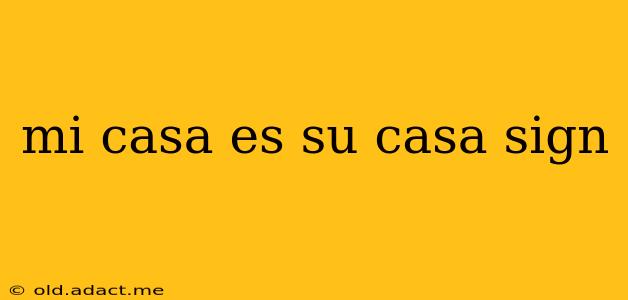"Mi casa es su casa" is a common Spanish phrase that embodies hospitality and welcoming warmth. It literally translates to "my house is your house," but its meaning goes far beyond a simple statement of ownership. This article delves into the true meaning, cultural nuances, and appropriate usage of this beloved phrase.
What does "Mi casa es su casa" really mean?
While the literal translation is straightforward, the phrase's true meaning is about extending genuine hospitality and making guests feel completely at home and welcome. It signifies a deep sense of trust and comfort, inviting the guest to relax and feel as if they are in their own space. It's not just an invitation to physically enter a home; it's an invitation to feel completely at ease and accepted.
Where does the saying "Mi casa es su casa" come from?
The origins of "mi casa es su casa" are difficult to pinpoint to a specific time or place. It's a phrase that likely evolved organically within Spanish-speaking cultures over time, reflecting a deeply ingrained tradition of hospitality. The emphasis on family and community in many Latin American and Spanish cultures has undoubtedly contributed to the phrase's widespread use and enduring popularity.
Is it appropriate to say "Mi casa es su casa" in all situations?
While the sentiment is universally appreciated, the appropriateness of using "mi casa es su casa" depends on context. It's best suited for close friends, family, and well-acquainted guests where a strong bond of trust already exists. While using it with acquaintances is generally acceptable as a polite gesture, it might seem slightly out of place or even insincere if the relationship lacks a certain level of familiarity. Overusing the phrase can also diminish its impact.
How is "Mi casa es su casa" used in different contexts?
The phrase's usage can vary subtly depending on the context and relationship:
- Close Friends & Family: It's used genuinely and often, reflecting a deep-rooted sense of belonging and shared comfort.
- Acquaintances: It serves as a polite and welcoming gesture, expressing a desire to make the guest feel comfortable.
- Business Settings: While potentially used in some less formal business settings, it might be considered inappropriate in most professional situations. A more formal greeting is generally preferred.
What are some similar phrases or expressions in other languages?
Many languages have equivalent phrases conveying a similar sentiment of hospitality:
- English: "Make yourself at home."
- French: "Faites comme chez vous."
- German: "Fühl dich wie zu Hause."
- Italian: "Sentiti come a casa tua."
Is there a proper response to "Mi casa es su casa"?
The best response depends on the context and relationship. A simple "Gracias" (Thank you) is always appropriate. However, depending on the level of familiarity, you might also add something like:
- "Muchas gracias, estoy muy cómodo/a." (Thank you very much, I'm very comfortable.)
- "Qué amable eres." (How kind you are.)
In conclusion, "Mi casa es su casa" is more than just a phrase; it's a reflection of cultural values and a genuine expression of hospitality. Understanding its true meaning and appropriate usage enhances communication and strengthens relationships within Spanish-speaking cultures and beyond. Its enduring popularity underscores the universal human desire for connection and a welcoming environment.
